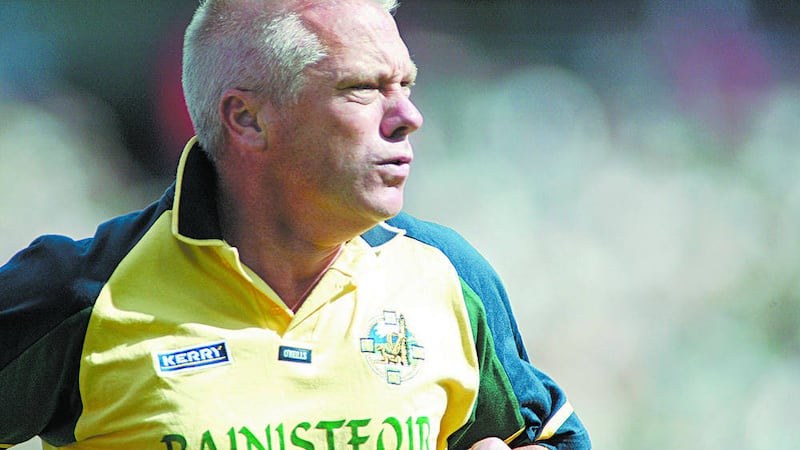ON a Tuesday night in the Tierney household, I am rarely in so my wife normally uses the peace and tranquillity and the utter dominance of the remote control to watch two or three hours of uninterrupted Holby City or Casualty which she has SKY-plussed before I return from underage football or training.
This week however, much to her disappointment, I was at home and after yawning my way through about half an hour of one of the British hospital dramas, she decided to make a quick brew.
I used this opportunity to regain the remote and browse the other channels - praying for something that Erindoors would relent to watching with me, instead of a malfunctioning A&E department in England.
I couldn’t believe my luck when I switched over to RTÉ to find a documentary on the great Paidi Ó Sé.
I knew I would be hugely entertained but I thought it would be a battle to maintain my better half’s interest for the hour or so but I couldn’t have been more mistaken as we both sat engrossed in what was a hugely entertaining biopic of the former Kerry stalwart.
There was so much more to Paidi than just a former Kerry footballer and manager: his friendship with Charlie Haughey and numerous other personalities, his business which still thrives today and yet at times, he was also a troubled character and it became very obvious amidst all the humour, legendary football stuff and notoriety that he was somewhat obsessive about his relationship with football.
Even though he achieved so many highs, it also provided him with quite a few lows as well.
One of the many moments of this wonderful portrayal of a Kerry legend that stood out for me was his inability to accept his mortality as a player.
Towards the end of a glittering career that included eight All-Ireland medals, he was dropped for a Kerry-Cork Championship match. There was a picture of the bench that day and you could see on his face the absolute hurt that it was causing him.
On that afternoon, Dinny Allen, the enigmatic Cork forward who Paidi had many a robust encounter with over the years, scored a goal and four points and at the final whistle Paidi went straight to his manager Mick O Dwyer on the side-line and said “If I had marked Allen, he wouldn’t have scored 1-4 and you would still be in the Championship!”
He was probably right in what he was saying but not in what he was doing. It hit me that Paidi, like most legends of the game, find it harder to walk away and admit they may be coming to an end of their career - rather than finding difficulty with anyone who may be questioning their ageing talent.
I suppose the bigger the name you occupy in the annals of the game and the more success you achieve, it becomes twice as hard for any sports player to acknowledge that their best days are behind them.
I know that in our own successful Armagh team, some of the bigger names struggled with what they thought and were probably being told was their perpetual right to a first team place.
The lesser lights like myself, and most others on the team, can slip away into the realms of retirement with few regrets because ultimately we know that out time has come and inevitably and regrettably, someone better has taken your place.
Yet the massive names sometimes suffer more inner turmoil about hanging up the boots.
After failing initially to nail down the Kerry manager’s job after his retirement even though he probably deserved it, Paidi finally got given the famous yellow tee of the Kingdom in 1995 as the county failed to win an All-Ireland in over a decade - since Paidi’s glory days as a player.
Success followed with numerous Munster titles and two All-Irelands as well as the emergence of his three hugely talented nephews who all have a bit of Paidi’s temperament and spirit (and probably more importantly - talent) in them.
Many thought that Kerry would dominate once more but defeats to Meath, Armagh and Tyrone in finals and semi-finals and an outburst labelling Kerry supporters as animals even though it was probably slightly misrepresented saw the great man being relinquished of his role as Kingdom manager.
Even though he was distraught at the sacking, less than a week later he was unveiled as the new manager of Westmeath.
Westmeath won their first Leinster title in his first year in charge and the cult status continued. During his reign, they filmed a training session and a two minute speech that Paidi gave to his team prior to a match was simply hypnotic stuff as you hung off every word that was laced with passion and intensity.
It was right there and then that I got what Paidi was all about.
I never played against him or really remembered his era, yet I got the immediate sensation that not only would I have liked him but I think I would have loved playing for him as he spoke with such absorbing desire.
I would say there is no place other than Killarney that Paidi would rather be on Sunday afternoon, stuck among an adoring crowd when Kerry and Cork renew their annual battle for a Munster title.
Unfortunately, he has been taken far too early and although I knew Paidi had legendary status - not only as a player but as a person – thanks to the makers of the show I now know why.
As to the Munster final itself, I think Kerry still have all the answers while Cork are talented but too erratic and unreliable. Kerry by four.





